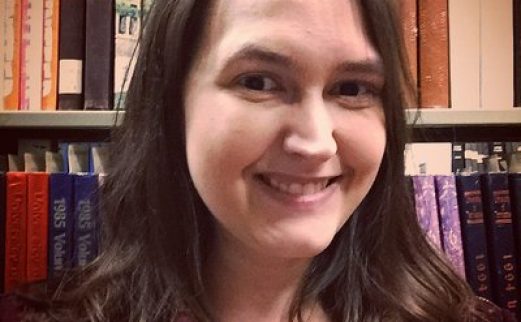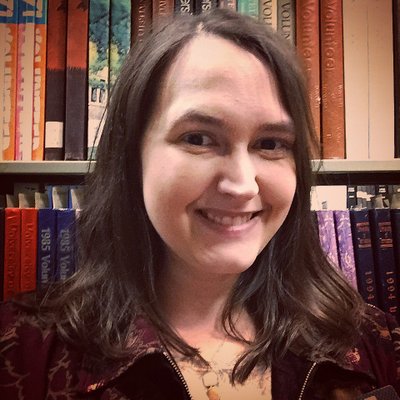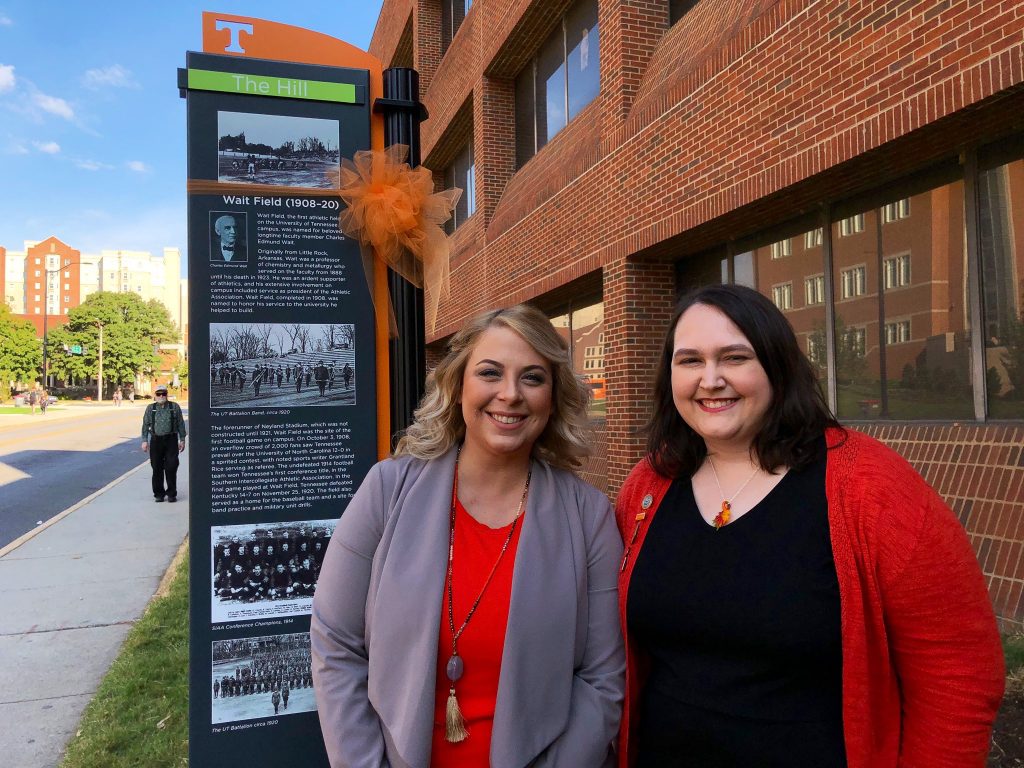
Tell us about your background. How did you become interested in archives?
I earned my bachelor’s in communications at the University of Tennessee, Knoxville, and immediately afterwards pursued a master’s from UT’s School of Information Sciences (SIS). A whirlwind of experiences in 2009 helped with the decision to go to graduate school. One, I found at my newspaper practicum that I enjoyed helping callers with their reference questions more than what I had been hired to work on. Two, I took three undergraduate courses from SIS and wanted to learn more. Three, I graduated in the middle of a precarious economic situation at the time and could not find a local editing job using my undergraduate major, journalism.
My interest in archives comes from family history and archives. My mom is an unofficial archivist for both sides of my family. I’ve helped her rescue photographs from acidic Stubley family reunion scrapbooks. The Stubleys, on my dad’s mother’s side, had a printing and lithography company in Knoxville. They printed some of the earliest university publications, including The Tennessee Alumnus, The Orange and White, and The Mugwump, until the university set up its own printing service. My maternal grandma keeps EVERYTHING. Some of the items my grandma saved have been donated to Special Collections. The most notable donation is the Thomas Conner Karns collection (unprocessed), which belonged to my granddad’s great-uncle, who was an 1871 UT alum, a UT education professor, and Knox County Schools’ second superintendent in its history. There’s a Knoxville high school named for him. My mind is blown that my family has so many connections to Knoxville and UT history, some of which I uncovered while on the job.
How did you make your way to working at UT Libraries? Did you have any idea while at graduate school at UT that you might end up being so instrumental in archiving and sharing the school’s history as an assistant archivist?
I had no idea grant-funded projects would lead to full-time employment working with UT history. I was hired to make accessible business records for a society that researched chemical mutagens’ effects on the environment. The society’s founders had connections to both UT and Oak Ridge National Laboratories, so that was a first taste in working with the university’s history in some way.
Later on, I was assigned to finish prepping Dr. Bill Bass’s research papers for a digital collection. Dr. Bass himself was so impressed by the Reading Room exhibit I curated for his celebratory lecture for the project that he offered to write me a recommendation letter. Shortly after that, Special Collections hired me on full-time as a staff assistant in University Archives.
What has been your experience working as an archivist since the pandemic started? In what ways do you see the pandemic changing work in the archives?
When the pandemic moved University Archives services and preservation activities online, we thought this would be for two weeks. Little did we know! We pivoted and focused on projects we can accomplish online in the long term. We’re providing remote research assistance; soliciting donations for the Chronicling COVID-19 project; proofreading and editing Volopedia and archives finding aids; and testing out the newly improved SCOUT finding aid database that debuted Fall 2020.
I love that my work encompasses collections and project management, research assistance, and outreach activities. That’s still true while working from home during a pandemic. It’s just all those activities have moved to a digital space. I also love that, with remote projects, my student assistants have the flexibility to work when they’re able to do so. My assistants would not have been able to work with us at all if I had not offered evening and weekend hours. I think that is a policy we should keep when things go back to some semblance of normalcy.
For you, what is the best part of being an archivist? What is the worst?
The best part of being an archivist is that I’m always learning. Every collection and research question I have worked on is an enjoyable exploration. I’ve learned more about UT’s traditions, college athletics, and the Tennessee Walking Horse than a normal person should. I mean, that first collection I worked on years ago was about chemical mutagens. That’s way out of left field for someone with an academic background in magazine feature writing and editing.
The worst part of being an archivist is having to explain what I do all the time, to the point of dispelling misconceptions about archives in every social context. My co-editor-at-large at the American Archivist Reviews Portal explores these myths on her blog, POP Archives, and there are several more archivists out there exposing stereotypes depicted in news stories, fiction, animation, and other media. For example, unpublished manuscripts in an author’s papers aren’t secrets. One of our employees made sure those manuscripts were placed in an archival quality folder, stored in an archival quality box in a climate-controlled storage facility, and listed in a collection inventory online.
What emerging areas in the profession do you think are the most important and why? What areas do you think are overlooked?
This past year, archives professionals have worked together to figure out how to offer research services, instructional sessions, and outreach programming in an online setting. They’ve been sharing their results in blog posts, webinars, virtual conferences, and more. Now we’re all reckoning with the fact the online services and tools we developed last year will be long-term responsibilities we will have to incorporate into our workdays, if we hadn’t already done that before. Mainly because they’re really popular! Ultimately the pandemic brought to light that there’s this area of archives public services that’s overlooked and warrants exploration. Fortunately, we’re experimenting with how to do that in Special Collections with new online resource guides on our digital teaching collections, women’s suffrage, and the 1918 Spanish flu. We also have video tutorials, workshops, event recordings, and exhibit tours available on UT Libraries’ YouTube page.
Finally, what is something important that you would you like for people to know about you and your work at Special Collections?
Honestly? University Archivist Alesha Shumar and I help everyone! We help family members verify their ancestors attended or taught at UT. We work with faculty and students at UT and other universities on locating primary sources for their research projects. Campus organizations come to us for assistance researching or preserving their institutional histories. We work with media outlets to supply them with content needed for news stories and documentaries, usually on a tight deadline. We have great partnerships with UT’s Office of Communications and Marketing and UT Libraries’ Marketing and Communications department, and they approach us if they need historical photographs or information. Don’t be shy about reaching out to us at archives@utk.edu.

